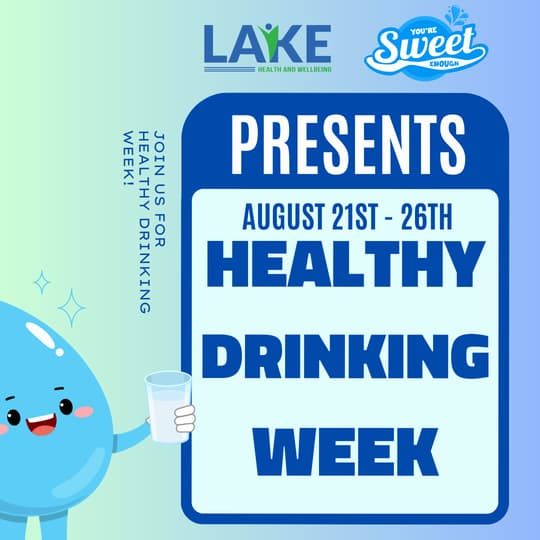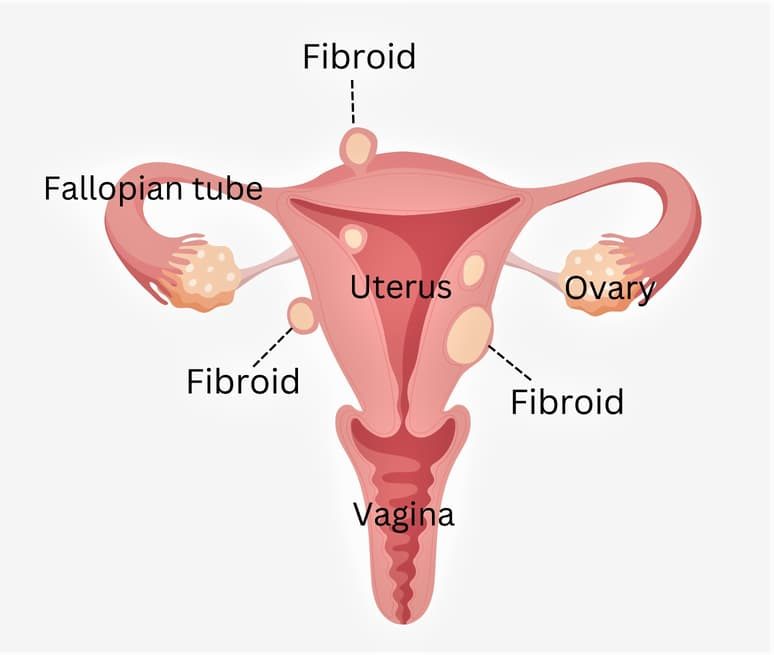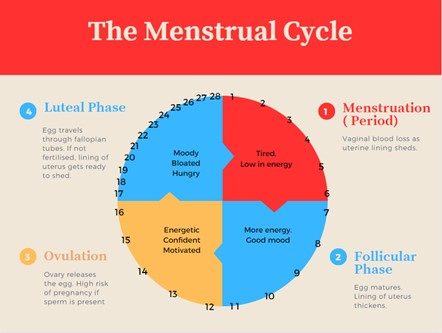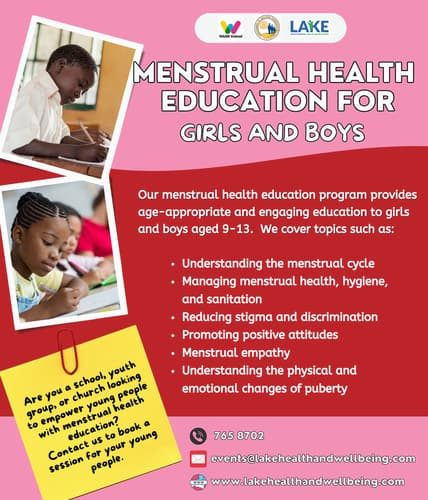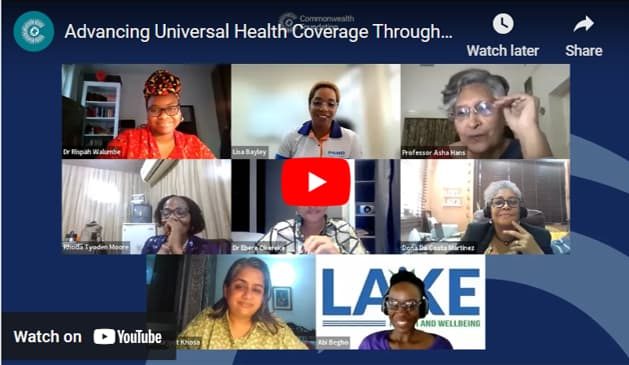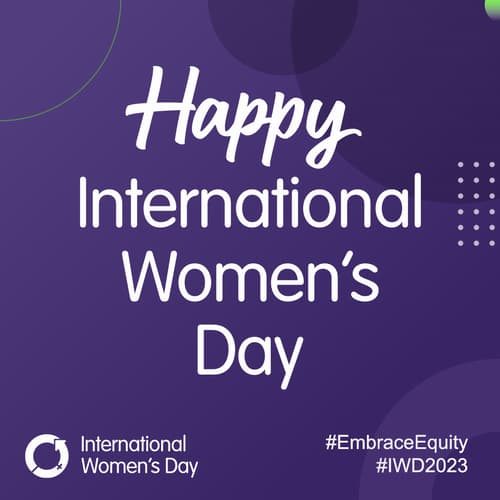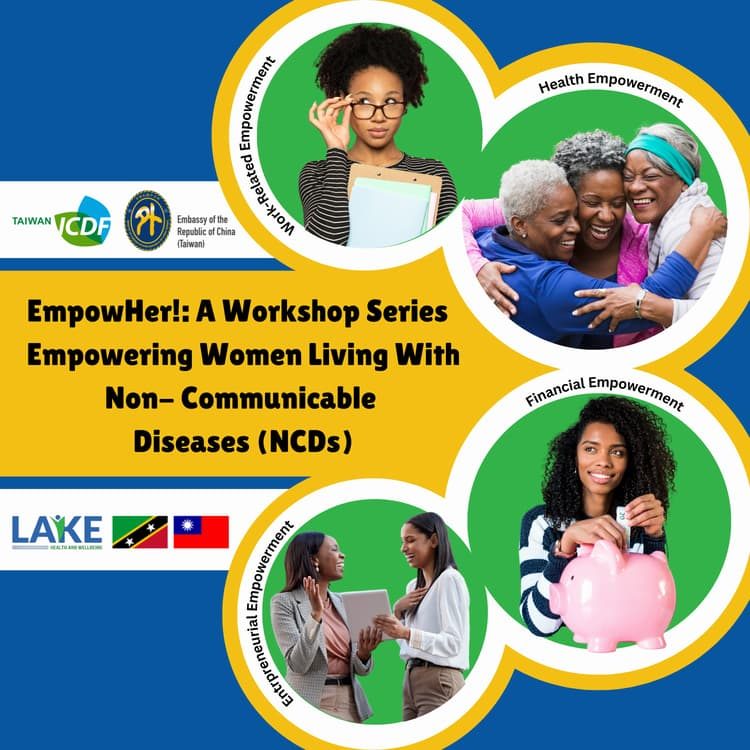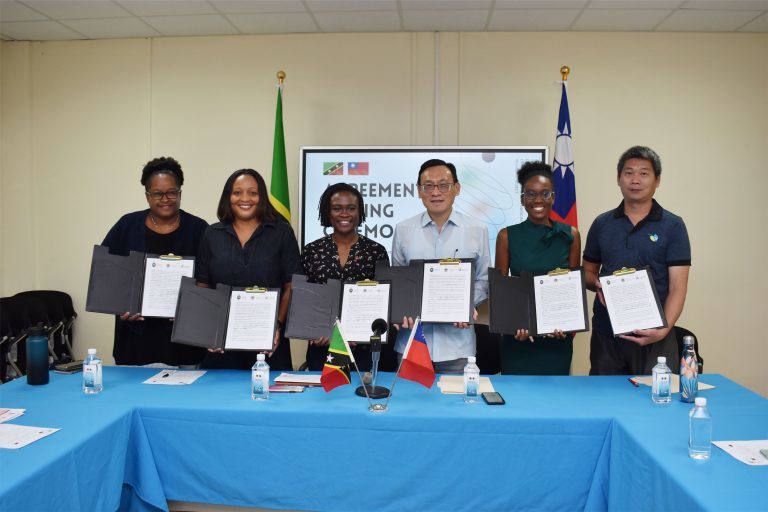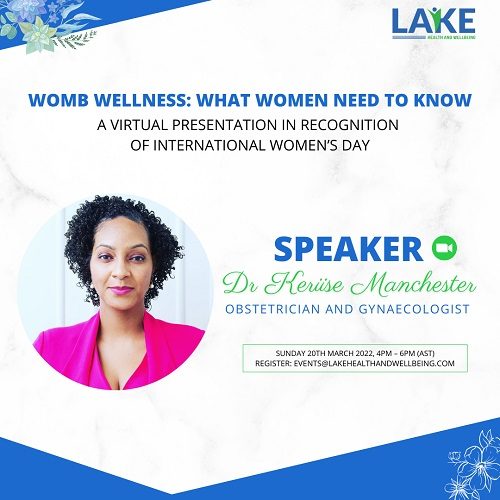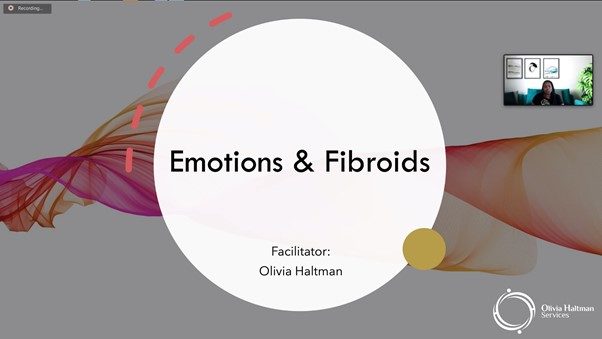Healthy Drinking Week
The 7-week SKN Moves annual campaign, which started on 1st August 2023, continues with a focus this week on promoting healthy drinking habits.
The 7-week SKN Moves annual campaign, which started on 1st August 2023, continues with a focus this week on promoting healthy drinking habits.
We are delighted to share another article from our guest blogger, Teresa Coburn. Teresa is a registered nurse with 30 years of clinical experience. She is now using her expertise, knowledge and skills to create engaging and socially responsible health content.
Today, we are delighted to share an article from our guest blogger, Teresa Coburn. Teresa is a registered nurse with 30 years of clinical experience. She is now using her expertise, knowledge and skills to create engaging and socially responsible health content.
If you have ever had a period, you will know how uncomfortable it can be! Stomach cramps, mood changes and craving sweet foods can be common symptoms.
But what is happening inside our bodies to make us feel this way?
Girls usually start their periods during puberty, typically between the ages of 11 and 17, and they will get periods all their life until they reach menopause around the age of 50. Also called ’Menstruation’, this is the regular vaginal bleeding that happens as part of the monthly Menstrual Cycle.
The Menstrual Cycle is a complex 4-stage process, driven by several important hormones, that happens every month to prepare the body for pregnancy. If pregnancy doesn’t occur, the period starts and the cycle begins again.
Stage 1. Menstruation (Days 1-6) – This is your period. The lining of the uterus sheds and you lose blood from your vagina. It marks the first day of the cycle and usually lasts for around 5 days.
Stage 2. Follicular phase (Days 7-11) – This is the time between your period coming to an end and before you release an egg (ovulate). During days 7 – 11, an egg starts to mature and the lining of the uterus thickens, ready to receive a fertilised egg and develop into a pregnancy.
Stage 3. Ovulation (Days 12 – 16) – An egg is released from the ovary. This usually happens in the middle of the cycle around days 12-16. The risk of pregnancy is very high if the woman has sex during this stage.
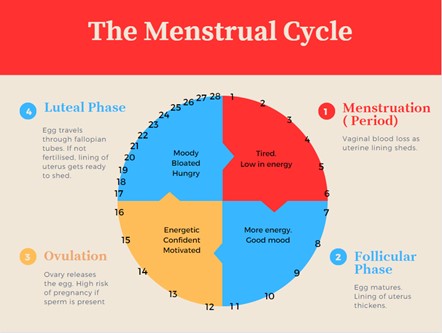
Stage 4. Luteal phase (Days 17-28) – This stage is the 11 days leading up to your next period and completes the Menstrual Cycle. The egg travels to the uterus through the fallopian tubes. If the egg is fertilised it will attach to the lining of the uterus and the woman will become pregnant. If the egg is not fertilised, the uterus gets ready to shed its lining and the menstrual cycle starts again from the beginning of Stage 1.
Although the menstrual cycle can average 28 days, many women experience differences in the length of their cycle. Anywhere from 21 to 35 days is common. And it can change each month depending on age, and lifestyle factors like stress or diet.
The hormonal changes that occur during the Menstrual Cycle can have a big influence on your moods and emotions. Pre-Menstrual Syndrome (PMS) is a term used for the range of symptoms you can experience in the days before your period (Luteal phase). These can include:
During this time, it is important to take care of yourself, physically and emotionally. Try to get a good sleep each night. Staying hydrated, eating regular healthy meals and taking gentle exercise can help stabilise your mood and your appetite.
The first few days of your period (menstruation) can be uncomfortable and you may experience:
The pain should be mild and easily managed with over-the-counter painkillers such as Paracetamol or Ibuprofen. Gentle exercise, like walking, can also help ease the pain.
A hot water bottle or heat packs can be soothing for the tummy and the lower back.
Some people find aromatherapy oils to be calming and relaxing. Lavender is a good choice to mix with olive oil and massage over your tummy.
Meditation and deep breathing, or relaxing in a hot bath can also help. But sometimes rest is all you can manage, so curl up with a good book, or a favourite TV show if you get the chance.
If any of your symptoms become severe or unmanageable, last longer than a few days, or you develop a fever, please go and see your doctor. There may be something else going on that needs medical attention.
Sometimes our menstrual cycle fluctuates and we notice different symptoms. This usually means our body is experiencing changes. If you experience any of the following, please go and see your doctor.
• Spotting or bleeding between periods or after sexual intercourse.
During your period, it’s important to use menstrual or sanitary products correctly, change them regularly and maintain cleanliness to prevent complications or infections. Always wash your hands thoroughly with soap and water, before and after changing your menstrual products.
Some options for menstrual products include:
Both of these options need to be disposed of correctly in a bin and not flushed down the toilet.
These are reusable, climate-friendly and cost-effective options. They need to be cleaned thoroughly after each use.
A healthy menstrual cycle is a complex dance of hormones that can be uncomfortable on occasion but is a natural and normal part of being a female. Understanding the process may help alleviate some of the discomfort and confusion you may have during this time. Making sure you are looking after your physical and emotional wellbeing during each stage is essential. Choose the sanitary protection that suits your lifestyle the best, and always maintain clean hygiene practices.
And remember, if you experience any unusual symptoms or have any concerns, please contact your doctor.
We are dedicated to promoting the holistic well-being of young individuals, and we believe that comprehensive education about menstrual health is an essential component of their growth and empowerment. That’s why we are thrilled to announce our new Menstrual Health Education Project aimed specifically at boys and girls aged 9 to 13 in St. Kitts and Nevis.
The goal of our project is to provide age-appropriate, inclusive, and engaging menstrual health education sessions to young people, fostering a positive understanding and attitude towards menstruation. We firmly believe that by equipping them with knowledge, we can empower them to embrace their bodies, support their peers, and break down the stigma surrounding menstruation.
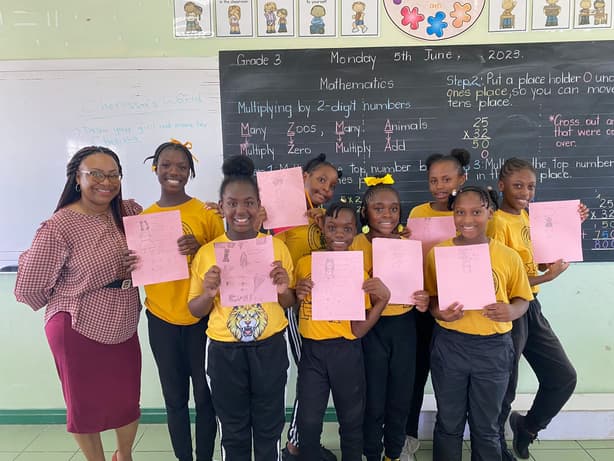

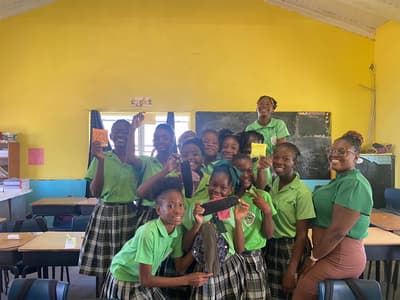

One of our key objectives is to raise awareness about what constitutes a normal menstrual experience. By educating young girls about the typical characteristics of a healthy period, we hope to empower them with the ability to recognize any abnormal symptoms. Prompt identification of irregularities such as persistent pain, heavy bleeding, or unusual discomfort can potentially indicate underlying conditions like fibroids or endometriosis. By facilitating early detection, we strive to support young individuals in seeking appropriate medical attention and securing timely diagnoses.
Sessions are thoughtfully designed to address a wide range of topics related to menstrual health, including the biology of menstruation, menstrual hygiene practices, managing menstrual discomfort, and understanding the emotional and social aspects of menstruation. We approach these subjects with sensitivity, ensuring that young participants feel comfortable, respected, and able to ask questions in a safe and non-judgmental environment.
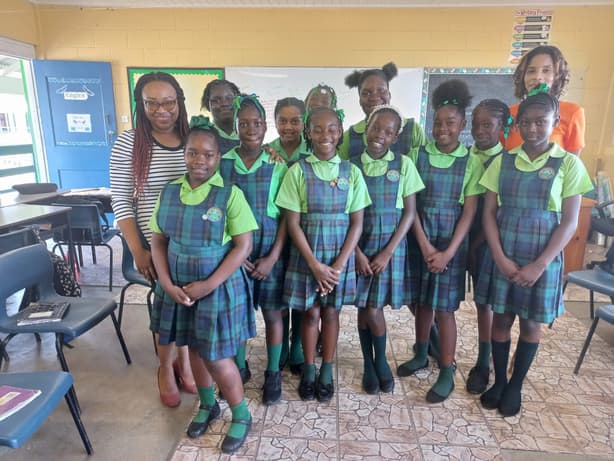

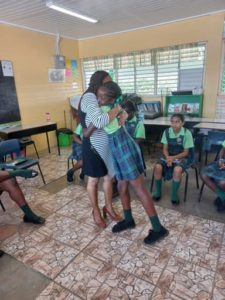

We understand the crucial role that schools, churches, and youth groups play in nurturing young minds and creating opportunities for growth. That’s why we extend an open invitation to these organisations to book a session for their young people.
Our passionate and trained menstrual health educators will visit your premises and deliver interactive sessions that align with your specific needs and objectives.
To book a session for your school, church, or youth group, simply reach out to us using the contact details provided on the flyer on your right.
Join us in this collaborative journey towards menstrual health education and make a lasting impact on the lives of young individuals.
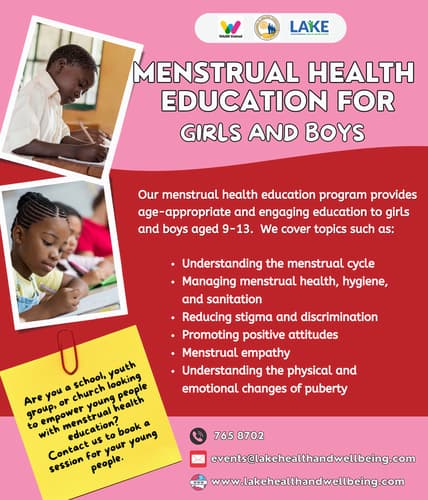

This project is being implemented in partnership with WASH United and supported by the Advancement of Children Foundation.
WASH United, is a leading organisation dedicated to menstrual hygiene advocacy, and they bring extensive expertise and experience in promoting menstrual hygiene and breaking down taboos surrounding menstruation. They have provided us with invaluable educational resources which have been adapted for St. Kitts and Nevis, training, and technical support, enabling us to deliver engaging and informative sessions tailored to the needs of our young audience.
This project would not be possible without a generous grant from the Advancement of Children Foundation. The Advancement of Children Foundation (ACF) is a non-profit organisation dedicated to positively impacting the lives of children and youth in our community. Their mission is to create a nurturing environment that fosters learning, growth, and contribution while providing essential community and family support. Committed to eliminating violence and negative coercive forces, ACF strives to create a safe and empowering space for young individuals to thrive. With a focus on education, health, and overall well-being, the Advancement of Children Foundation plays a pivotal role in supporting initiatives that enhance the lives of children and youth in St. Kitts and Nevis. Their belief in the importance of menstrual health education has made it possible for us to reach more young people and create a lasting impact on their well-being.
Together with WASH United and the Advancement of Children Foundation, we are dedicated to empowering young individuals with knowledge, dismantling taboos, and fostering a positive attitude towards menstruation.
Universal Health Coverage (UHC) is a fundamental human right, which means that everyone should have access to essential health services without financial hardship. While some progress has been made in some parts of the world, gender inequality remains a significant barrier to achieving UHC. Women and girls face unique challenges when it comes to accessing healthcare, including discriminatory policies, social and cultural norms, and economic constraints.
In February, the Commonwealth Foundation hosted a Roundtable discussion on Advancing Universal Health Coverage through Gender Equality. The event was attended by health experts and civil society leaders, including our Programme Director, Abi Begho. The event was an opportunity to discuss the importance of gender when introducing universal healthcare and to explore ways to make health systems more equitable and inclusive.
During the discussion, panellists shared insights on why gender-sensitive health policies matter, what policies make health systems more equitable and inclusive, and how to build adequate and resilient health systems that are efficient, accessible, and equitable. Civil society leaders working directly with communities on health access for women and girls also shared their experiences and provided valuable input.
One of the key takeaways from the Roundtable discussion was the need for gender-sensitive policies that address the specific health needs of women and girls. This includes policies that address reproductive health and maternal health, as well as policies that address the unique health needs of women at different stages of their lives, such as menopause and post-menopause.
Another key takeaway was the importance of building adequate and resilient health systems that are efficient, accessible, and equitable. This includes investing in health infrastructure, training and supporting health workers, and ensuring that essential medicines and supplies are available and affordable.
The discussion also highlighted the importance of involving civil society in the policymaking process to ensure that the needs and perspectives of women and girls are taken into account. Civil society organizations play a critical role in advocating for gender-sensitive policies and holding governments accountable for their commitments to UHC.
At the end of the discussion, participants had the opportunity to develop key policy asks that will go to Health Ministers and policymakers within and beyond the Commonwealth. This was an important step in ensuring that the voices of civil society are heard and that policies are developed with the needs of women and girls in mind.
In conclusion, the Commonwealth Foundation’s Roundtable discussion on Advancing Universal Health Coverage through Gender Equality was an important event that highlighted the need for gender-sensitive policies and equitable health systems. It was an honour to contribute to this conversation and to work alongside other health experts and civil society leaders to promote UHC for all. By working together and advocating for gender-sensitive policies, we can create a world where everyone has access to essential health services and can live healthy, fulfilling lives.
International Women’s Day is a time to celebrate the achievements of women and acknowledge the work that still needs to be done to promote gender equality. One area where gender disparities persist is in women’s health, particularly when it comes to non-communicable diseases (NCDs).
NCDs are responsible for more than two-thirds of all deaths worldwide, and in St Kitts and Nevis, they account for over 80% of deaths and illnesses. Women in the Federation are disproportionately affected by some NCDs, such as diabetes and cancer, and are also at risk of developing chronic reproductive illnesses such as fibroids, endometriosis and PCOS.
Women’s exposure to stress, which is often linked to the many roles they fill in society, can increase their risk of developing an NCD. Cultural barriers, gender stereotypes, and discrimination can also contribute to poor health outcomes for women.
To address these disparities, gender-sensitive health policies are necessary. These policies must be informed by research and take into account the unique needs and experiences of women. They should also focus on reducing disparities in health outcomes between different groups of women, such as those based on age and income.
Gender-sensitive health policies must prioritize access to essential health services and address the social and economic factors that contribute to poor health outcomes. This includes ensuring access to maternal and reproductive health services, mental health services, and services for NCDs.
International Women’s Day provides an opportunity to reflect on the progress made towards improving women’s health and renew our commitment to advancing gender equity. It is a reminder that women’s health is a human rights issue, and that everyone has a role to play in promoting gender equality and empowering women to take control of their health.
Let’s work together to create gender-sensitive health policies that are grounded in the principles of equity and inclusion, and prioritize women’s health in our personal and professional lives. By making healthy lifestyle choices, advocating for policies that promote women’s health, and supporting organizations that work towards improving women’s health outcomes, we can create a world where all women have access to the care they need to thrive.
We are thrilled to announce the successful launch of our EmpowHer project, which aims to empower women living with non-communicable diseases (NCDs) in St. Kitts and Nevis.
The launch event, which took place on Monday 13th February, was a great success and featured a number of inspiring speakers who shared their insights and expertise on gender and NCDs.
The event started with a beautiful opening prayer by Novelia Rawlins-Nwosu, Coordinator of the Chronic Metabolic Disease Programme at the Ministry of Health. This was followed by an introduction by Abi Begho, Programme Director at Lake Health and Wellbeing, who gave an overview of the project and its goals.
His Excellency Michael Chau-Hong Lin, Resident Ambassador for the Republic of China Taiwan, also delivered a speech, expressing his country’s support for the project and its commitment to improving the lives of women living with NCDs.
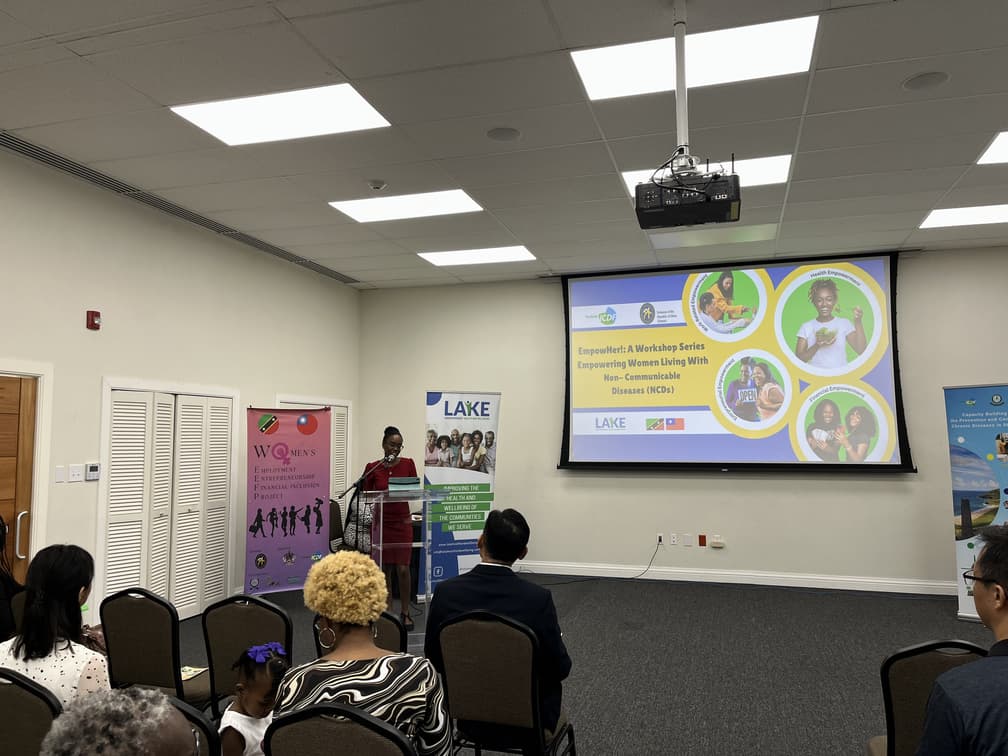

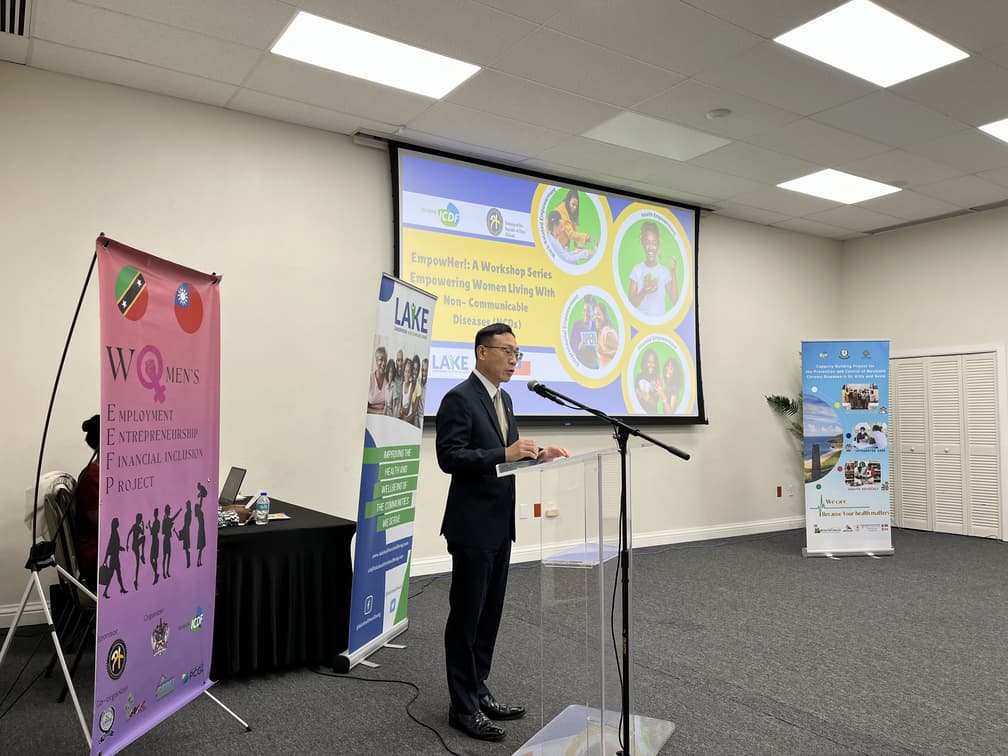

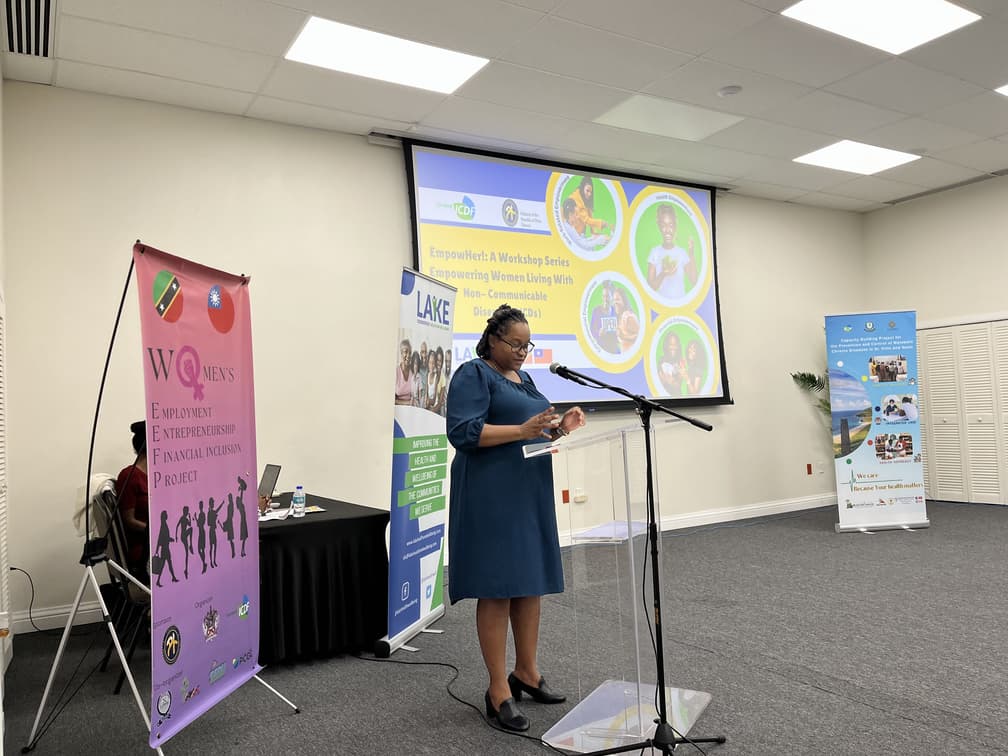

The Permanent Secretary of the Ministry of Social Development and Gender Affairs, Ms Azilla Clarke, also spoke at the event. Her remarks highlighted the important role that women play in society and the need to address the specific challenges that women living with NCDs face.
Dr Marissa Carty, NCD Programme Coordinator at the Ministry of Health, delivered an informative and inspiring talk on NCDs and women in St. Kitts and Nevis. Terysia Herbert-Browne, Project Officer at Lake Health and Wellbeing, also gave a detailed presentation on the EmpowHer project, its objectives, and its expected outcomes.
The event was brought to a close by Andrew Tseng Kuo, Project Manager for the Women’s Employment, Entrepreneurship and Financial Inclusion Project (WEEFIP) project, who emphasized the important role that the project will play in empowering women and supporting them in their efforts to overcome the challenges they face.
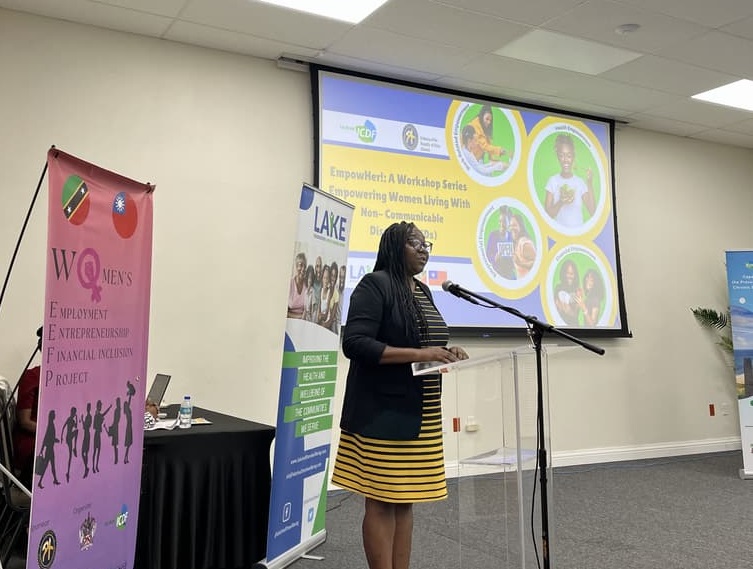

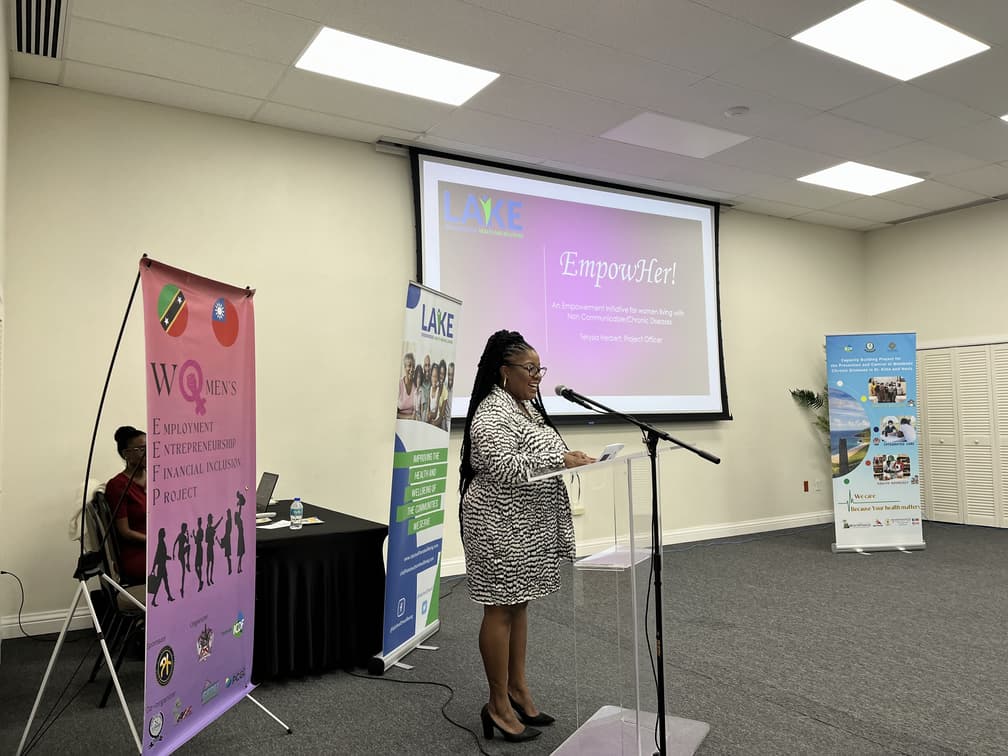

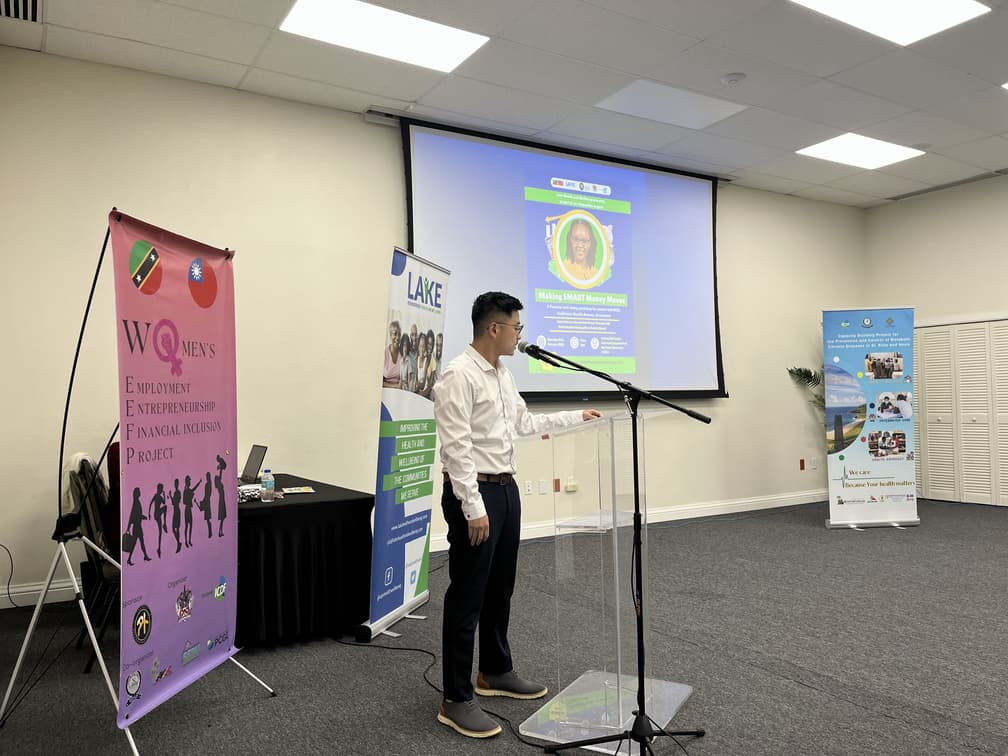

We are excited about this project and its potential to make a real difference in the lives of women living with NCDs in St. Kitts and Nevis. We believe that by focusing on women who are living with these conditions, we can help to improve their quality of life and promote positive health outcomes.
If you missed the launch event, you can access the full recording on YouTube below.
There is also a short 4-minute summary video of the launch that you can view below.
If you would like to register for the EmpowHer workshops or find out more about the project, please email us at events@lakehealthandwellbeing.com. We would be delighted to hear from you and to share more about this important initiative.
We are extremely grateful to the Ministry of Social Development & Gender Affairs and the Republic of China (Taiwan) for selecting us as one of the winners of the Women’s Empowerment Initiative Contest and awarding us funding to implement a project to empower women living with non-communicable diseases (NCDs).
This project was birthed out of a research project we conducted last year, with funding from the Commonwealth Foundation. This research project explored the gendered impact of the COVID-19 pandemic on people living with NCDs in St. Kitts and Nevis. One of the key findings of this project was that single mothers on a low income were particularly vulnerable during the pandemic. This was because they were already trying to manage their chronic illness while fulfilling their many roles and responsibilities, (being a mother, working, caring for older parents etc.) with sometimes little or no practical, emotional or financial support. As a result of this, they were exposed to a high level of stress which can exacerbate their NCD and the disaster-related stress caused by the pandemic compounded these issues.
Our project aims to empower women living with NCDs professionally, personally and financially, and we also aim to provide guidance on NCD self-management and self-advocacy to ensure that women can successfully manage their health condition and advocate for themselves. Through this work, we hope that we will enable women living with chronic health conditions to live a full life where they are able to thrive.
We are very much looking forward to starting this project and if you are a woman living with a chronic health condition or know someone who lives with a chronic health condition who may benefit from our project, then please do get in touch with us by emailing info@lakehealthandwellbeing.com
You can find out more about the Women’s Empowerment Initiative Contest and the other winner, Tab SKN, here and here
This year, the theme for International Women’s Day was ‘Break the Bias,’ and organisers asked us all to imagine a world that is free of bias, stereotypes and discrimination and built on equity and inclusivity. A world where women have full access to opportunities, information and the freedom to define their own success.
When it comes to women’s health issues like fibroids, endometriosis and PCOS, many biases exist, such as: these conditions are “not that bad”, “not really that painful” and “not a public health priority.” These biases have left women with subpar treatment options, a lack of information to make informed choices about their health and a lack of appropriate support. As we neared International Women’s Day, one of this year’s missions reminded us to stand up and address these health-related biases so that women are empowered and can take control of their health. Therefore, in recognition of International Women’s Day, we hosted a virtual womb wellness presentation with guest speaker, Dr Keriise Manchester, an obstetrician and gynaecologist in St. Kitts and Nevis and founder of Manchester Medical.
Our womb wellness session was aimed at women in St. Kitts and Nevis and focused on providing women with information and guidance on what they need to know about their womb health. Dr Manchester provided a very comprehensive presentation exploring womb wellness throughout a women’s life course from childhood to the post-menopausal stage. The session was accessible in the way it was presented, informative and empowering and we would like to thank Dr Manchester for being a guest speaker for this session and sharing her expertise.
There is still a lot of stigma and sensitivity around the challenges that women may face with their womb health and we hope that this session provided a safe space where women could learn about an important health issue and made them feel more comfortable about talking about these issues so that they are can be addressed and treated promptly.
If you missed this session, you can watch the recording below and if you have any questions, please don’t hesitate to send us an email.
On Saturday 31st July 2021, we were delighted to host a webinar on fibroids and mental health. This webinar was part of our Fibroids Awareness Month event series which aimed to empower women living with fibroids with information on how to manage the impact of fibroids.
A very important issue for women living with fibroids is managing the mental and emotional impact of fibroids. Therefore, we invited Olivia Haltman, an accredited counsellor from OH Counselling Services, to help attendees identify, understand and address the many ways that fibroids can affect a woman’s emotions and mental health.
This session also explored how women can heal and successfully navigate the challenges that living with fibroids may present.
If you missed this session, you can watch the recording below.

